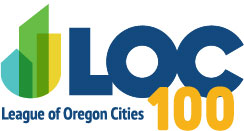LOC News
SB 762 – Wildfire Policy, Communications Needed
As part of the LOC’s efforts to represent the interests of cities regarding wildfire policy, we have maintained a dialogue with Governor Brown’s office, a diverse set of interest groups, the state fire marshal, and several legislators, including Senator Golden who is the principal sponsor of SB 762. Much of this effort has included a professional, transparent process, including submitting amendments last week to Senator Golden and others who are working on the bill. The point of the amendments is to improve the bill, and will by no means slow the process down or the effort to reduce wildfire risk.
At this time, the process is in limbo, without any real sense of what elements of the LOC’s recommendations will be included in the amendment package. The LOC, along with other cities and counties, has been trying to gain assurances that our issues have been taken seriously and will be addressed in the amendment package for SB 762. The League has yet to receive any confirmation, so we are asking those cities impacted by wildfires this last year and previously to engage on the issue now.
The LOC recommends that cities take the time now and reach out to their respective senators and representatives and let them know there are critical areas that need be addressed. They in include the following:
Wildfire Risk Mapping:
The most critical step forward with SB 762 will be the development of the fire risk map, because it will trigger changes in management by landowners, businesses and how communities plan for the future. For these reasons, we strongly support a process to allow for landowners and local governments to work with Oregon Department of Forestry (ODF) and identify errors within a reasonable amount of time. Due to the scope of this map’s impacts, it makes sense to have a local or regional process for evaluating technical errors with the map. The LOC will only support changes that are based on the technical aspects of creating the map. If the ODF uses the Board of Forestry to evaluate mapping appeals, we are concerned they would be overwhelmed. This is why the LOC supports an effort that could be regional or perhaps focus on fire protection districts.
Defensible Space and Oregon’s Land Use System:
While we support the role of the Oregon State Fire Marshal to oversee developing defensible space standards, it's also essential for the Oregon Department of Land Conservation and Development and city experts to help roll those standards into the state’s land use system. Given the potential impacts on many different aspects of urban planning, the intersection of defensible space standards and Oregon’s unique land use system needs to be fully considered to ensure that they work in unison. Defensible space standards will become siting standards that could impact other urban priorities, including housing, economic development, infrastructure planning, and many other goals. This means its critically important for SB 762 to commit to Oregon’s land use system as the pathway forward for adjusting changes to land use.
Phasing in the Rules:
We have no interest in delaying the roll-out of the defensible space standards and those related to home hardening, but we need to have a commitment in legislation to provide a step-by-step process. We anticipate the impacts of the risk mapping will affect not just hundreds of properties, but thousands. Therefore, it makes sense for SB 762 to commit to a process that focuses on education of landowners and communities, provides incentives to get the work done, but also gives landowners a chance to complete the work and self-certify, while providing the state fire marshal the ability to verify and initiate possible fines for lack of response. From our perspective, the education should start this summer and progress through next spring and summer, once the mapping has been completed.
Critical Municipal Infrastructure:
We have not had a chance to review the most recent rules from the Oregon Public Utility Commission (PUC), but we want assurances that SB 762 will direct utilities to provide a process forward to protect the electrical grid for cities to operate their water supply and sewer systems during a crisis. The last thing cities need to deal with during a fire emergency is scrambling to restart a water supply system due to de-energizing the grid.
Request:
Please write your representative and senator and include the messages above. When you send your letter, please cc: Senator Betsy Johnson and Senator Elizabeth Steiner Hayward. These senators are co-chairs of the Ways & Means Committee, where SB 762 currently sits.
Contact: Jim McCauley, Legislative Director - jmccauley@orcities.org
Last Updated 5/28/21

